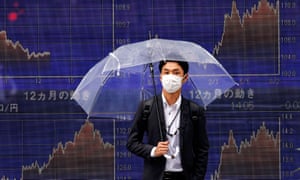
Japan is set to extend its state of emergency in Tokyo and other regions to 12 September and widen curbs to seven more prefectures, as Covid-19 cases spike in the capital and nationwide, burdening the medical system.
The current state of emergency is due to expire on 31 August, but a continuing surge in coronavirus cases has spurred calls for an extension, Reuters reports. Tokyo announced 2,962 new daily cases on Monday, after a record 5,773 on Friday.
The state of emergency will cover slightly less than 60% of the population after the government adds the prefectures of Ibaraki, Tochigi, Gunma, Shizuoka, Kyoto, Hyogo and Fukuoka.
“Many experts expressed an extremely strong sense of crisis about the medical care situation and the status of infections,” Economy Minister Yasutoshi Nishimura said after getting approval from a panel of public health advisers for the expansion.

Prime Minister Yoshihide Suga is expected to formally announce the move later on Tuesday. He will then hold a news conference at 9pm (12pm GMT) to explain the decision.
The coronavirus curbs include asking restaurants to close early and stop serving alcohol in exchange for a government subsidy.
Worries about the fast-spreading Delta variant of the coronavirus detracted from upbeat earnings on Tuesday, with the broad Topix (Tokyo Stock Price Index) giving up gains to slip deeper into negative territory after the lunch break.
Dai-ichi Life Research Institute estimated in a report the government’s extended and expanded state of emergency would lead to a total economic loss of about 1.2 trillion yen ($10.98 billion) and could slash 66,000 jobs.
That was about 60% higher than an expected economic loss of about 750 billion yen if the emergency remained at its current scope and schedule.
The expert advisers also approved the government’s plan to expand less strict “quasi-emergency” measures to 10 additional prefectures, Nishimura said.
Repeated states of emergency have had limited effect in slowing the spread of the virus in Japan as cooperation is voluntary.
Takuto Honda, a 20-year-old university student in southwestern Fukuoka city who works part-time at a karaoke shop, said he thought a harder lockdown with government pay-outs would be more effective.
“If there is money to host the Olympics, there should be money to compensate us,” he said.
Pandemic fatigue and summer vacations have also been blamed for contributing to the latest COVID-19 surge in a nation where only around 37% of people have been fully vaccinated.


